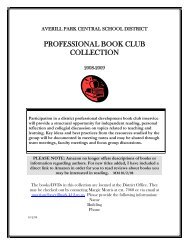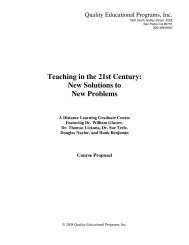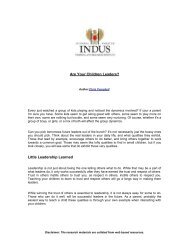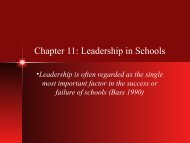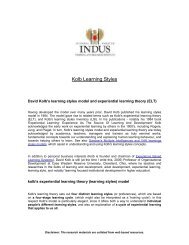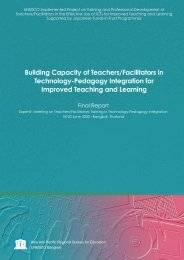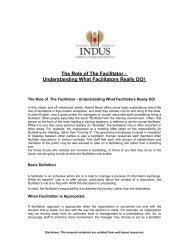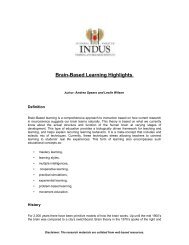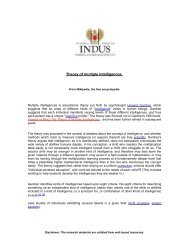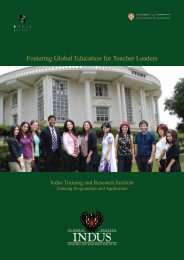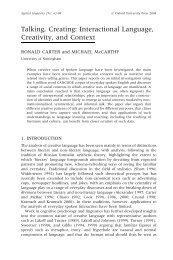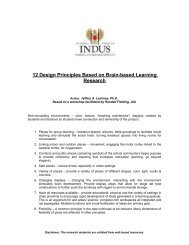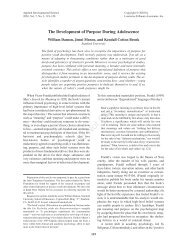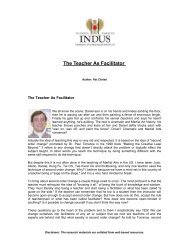Primary Years Programme Making the PYP happen - ITARI
Primary Years Programme Making the PYP happen - ITARI
Primary Years Programme Making the PYP happen - ITARI
- No tags were found...
Create successful ePaper yourself
Turn your PDF publications into a flip-book with our unique Google optimized e-Paper software.
<strong>Making</strong> <strong>the</strong> <strong>PYP</strong> <strong>happen</strong><br />
Language perspective<br />
The <strong>PYP</strong> recognizes that language, our major means of thinking and communicating, is fundamental to learning,<br />
underpinning and permeating <strong>the</strong> whole curriculum. It is not only learning language but also learning about language<br />
and through language and we should nurture an appreciation of <strong>the</strong> richness of language, including a love of literature.<br />
Traditionally language has been treated in a fragmented way, with separation of <strong>the</strong> strands within language and of<br />
language from o<strong>the</strong>r areas of <strong>the</strong> curriculum. The <strong>PYP</strong>’s approach to language seeks to lessen this fragmentation. While<br />
<strong>the</strong> four communication strands of listening, speaking, writing and reading can be observed separately, <strong>the</strong>y are<br />
interrelated and interactive, with learning in one supporting learning in ano<strong>the</strong>r. This is of particular relevance for<br />
international schools, where every teacher is a language teacher.<br />
The <strong>PYP</strong> considers language from <strong>the</strong> points of view of homeroom teachers, teachers of <strong>the</strong> language of instruction<br />
(often ESL), teachers of o<strong>the</strong>r languages (often <strong>the</strong> host country language) and teachers of mo<strong>the</strong>r tongue languages. The<br />
student profile identified applies to each student in every language taught, although <strong>the</strong> means and pace of teaching <strong>the</strong>m<br />
may, and will, differ in different contexts.<br />
Language does much more than promote cognitive growth: <strong>the</strong> <strong>PYP</strong> believes that mo<strong>the</strong>r tongue language development<br />
is crucial for maintaining cultural identity and emotional stability and that acquisition of more than one language<br />
enriches personal growth and helps facilitate international understanding. International schools have a special<br />
responsibility to recognize and support each and every aspect of language development.<br />
Ma<strong>the</strong>matics perspective<br />
Our rapidly changing technological world is placing ever increasing demands on <strong>the</strong> ma<strong>the</strong>matical skills and<br />
understanding of its citizens. As <strong>the</strong> <strong>PYP</strong> has considered how it could help students meet <strong>the</strong>se demands, it has become<br />
clear that <strong>the</strong> place of ma<strong>the</strong>matics in <strong>the</strong> curriculum is as a service discipline, providing a global language through<br />
which we make sense of <strong>the</strong> world around us. Such is <strong>the</strong> power of ma<strong>the</strong>matics in describing and analysing that it has<br />
become a highly effective tool for solving problems.<br />
The <strong>PYP</strong> wants students to become fluent users of this language and look on ma<strong>the</strong>matics as a way of thinking ra<strong>the</strong>r<br />
than as a fixed body of knowledge.<br />
Much of <strong>the</strong> failure of traditional ma<strong>the</strong>matics curriculums to teach <strong>the</strong> discipline well derives, in <strong>the</strong> <strong>PYP</strong>’s view,<br />
from <strong>the</strong> attempt to impart a body of knowledge directly to students. It is our conviction that students acquire<br />
ma<strong>the</strong>matical understanding by constructing <strong>the</strong>ir own meaning, concept by concept, through ever increasing levels of<br />
abstraction. Moreover, it is fundamental to <strong>the</strong> <strong>PYP</strong>’s philosophy that, since it is to be used in context, ma<strong>the</strong>matics<br />
needs to be taught in relevant, realistic contexts.<br />
Beyond this, however, <strong>the</strong> <strong>PYP</strong> believes that students can appreciate <strong>the</strong> intrinsic fascination of ma<strong>the</strong>matics and<br />
explore <strong>the</strong> world through its unique perceptions.<br />
Science and technology perspective<br />
Beliefs and values<br />
Social studies perspective<br />
Science is viewed by <strong>the</strong> <strong>PYP</strong> as <strong>the</strong> exploration of behaviour and <strong>the</strong> interrelationships among <strong>the</strong> natural, physical and<br />
material worlds using <strong>the</strong> rational process of scientific inquiry; technology is viewed as <strong>the</strong> application of <strong>the</strong> principles<br />
of science.<br />
The <strong>PYP</strong> recognizes <strong>the</strong> importance of science in an international curriculum as science is universal and cuts across<br />
gender, cultural, linguistic and national bias and transcends boundaries.<br />
The inclusion of science and technology within <strong>the</strong> curriculum leads students to an appreciation and awareness of <strong>the</strong><br />
world as it is viewed through <strong>the</strong> eyes of <strong>the</strong> scientist. It develops an understanding of, and competence in using, <strong>the</strong><br />
facilities of a rapidly changing scientific and technological world, while gaining a positive image of science and<br />
technology and its contribution to <strong>the</strong> quality of life today.<br />
The science and technology process, by encouraging hands-on experience and inquiry learning, enables <strong>the</strong> individual to<br />
make informed and responsible decisions, not only in science and technology but also in o<strong>the</strong>r areas of life.<br />
Social studies is viewed by <strong>the</strong> <strong>PYP</strong> as <strong>the</strong> study of people in relation to <strong>the</strong>ir past, <strong>the</strong>ir environment and <strong>the</strong>ir society.<br />
Social studies helps students to develop <strong>the</strong>ir personal, family, ethnic and cultural identities; to make informed and reasoned<br />
decisions about <strong>the</strong>ir classroom, <strong>the</strong> school and <strong>the</strong> world; and to understand <strong>the</strong>mselves in relation to <strong>the</strong> past, <strong>the</strong><br />
environment and society.<br />
Social studies in <strong>the</strong> international school is international. It teaches tolerance of diversity, social diversity and diversity of<br />
gender. It actively values all cultures and peoples. Emphasis is placed on <strong>the</strong> reduction of prejudice and discrimination<br />
within <strong>the</strong> classroom, <strong>the</strong> school and <strong>the</strong> world.<br />
Social studies in <strong>the</strong> international school goes beyond respecting and valuing people’s right to be different. It is grounded in<br />
a strong and unequivocal stand for universal human rights, justice and equality. If a difference occurs between <strong>the</strong> values of<br />
a specific culture and universal human rights, social studies in <strong>the</strong> international school leads students to value <strong>the</strong> universal,<br />
while respecting <strong>the</strong> perspective of <strong>the</strong> specific culture.<br />
The pluralistic nature of communities within and among nations, and <strong>the</strong> relationships between local and global concerns<br />
and issues, are addressed through <strong>the</strong> study of <strong>the</strong> host society, <strong>the</strong> students’ own cultures and <strong>the</strong> cultures of peoples not<br />
directly represented in <strong>the</strong> school’s community. When social studies in <strong>the</strong> international school asks: “What history”,<br />
“What geography” and “What social framework”, it leads a diverse student body to a wide understanding of humankind.<br />
Social studies examines human diversity and human commonalities, using <strong>the</strong> perspectives and experiences of <strong>the</strong> school’s<br />
families, staff and host society.<br />
Social studies does all this best through a questioning approach in which students create <strong>the</strong>ir own knowledge and<br />
understanding. Students and teachers exploring, investigating and searching for answers toge<strong>the</strong>r, develop historical,<br />
geographical and social concepts which are important in understanding today’s social world.<br />
Social studies is an integrated area of inquiry. The unique perspectives of a number of disciplines contribute to our<br />
understanding of human activity. For <strong>the</strong> purpose of this curriculum <strong>the</strong>se disciplines have been grouped as follows:<br />
History is <strong>the</strong> study of what we think is important about <strong>the</strong> human past. Students need to develop an understanding of<br />
<strong>the</strong>mselves and <strong>the</strong>ir society in relation to <strong>the</strong> past, its influences on <strong>the</strong> present and its implications for <strong>the</strong> future.<br />
Geography is <strong>the</strong> study of <strong>the</strong> relationship between people and <strong>the</strong>ir created and natural environment. Students need to<br />
develop a sense of <strong>the</strong> physical reality of <strong>the</strong> world, where <strong>the</strong>y are in it and <strong>the</strong> variety of human activity.<br />
Society is <strong>the</strong> study of people and <strong>the</strong>ir relationships. It draws on <strong>the</strong> disciplines of anthropology, economics, ethics,<br />
politics, psychology and sociology. students need to develop an understanding of how human values shape social systems.<br />
Figure 2 Beliefs and values<br />
© IBO 2000 7



